Text
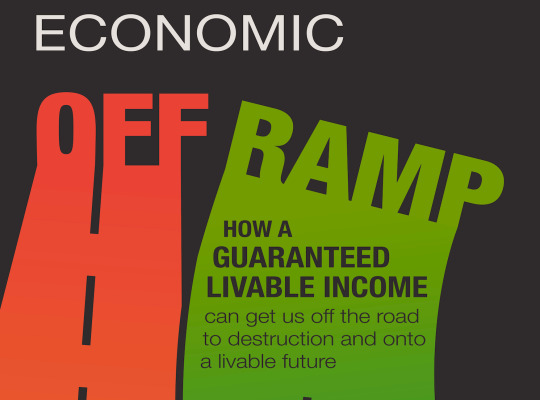
New book: Economic Offramp: How a Guaranteed Livable Income Can Get Us Off the Road to Destruction and Onto a Livable Future by C.A. Delle.
How a Guaranteed Livable Income (a.k.a. universal basic income ) can be a practical shift to a livable economy to help people and the environment.
About The book
There are a seemingly endless number of books, articles, and documentaries addressing the array of challenges confronting humanity and our ecosystem. This book shows how a guaranteed livable income (aka universal basic income) is a practical economic solution that embraces and enhances individual freedom, health, democracy, skills, problem-solving, innovation, and the environment. Through a blend of personal anecdotes, speculative economic analysis, and research, Economic Offramp delves into the many potential impacts of implementing such an initiative. It explores how this concept could shape various dimensions of our world - from society and communities to families and individuals. C.A. Delle extends an open invitation to become part of a movement that has the potential to steer us away from the path of destruction and towards a livable future.
Info for purchase or free book options here: https://3pennypublishing.com/econonomic-offramp-book/
14 notes
·
View notes
Text
Hugh Segal: Those close to him say he was an ardent defender of civil liberties, and a lifelong advocate for a guaranteed annual income. https://globalnews.ca/news/9888113/hugh-segal-obituary/
1 note
·
View note
Text
How Can We Afford a Universal Basic Income (UBI)? - Books With Answers
One of the most common questions to come up whenever people talk about a universal basic income is: how can we afford it?
There is an easy answer to that: we can’t afford NOT to implement an emergency UBI as the costs of poverty and the costs to the environment are catastrophically too high to continue the current economic system. That’s because this system relies on an impossible model of endless economic growth and trying to create enough jobs for everyone -- even if many of those jobs are meaningless, demoralizing, harmful, wasteful make-work jobs.
However, many people involved in making or explaining policy will want to read some detailed policy-oriented books to make their case for a UBI. Here are a few top choices.
1) FINANCING BASIC INCOME - RICHARD PEREIRA
2) THE DEFICIT MYTH - STEPHANIE KELTON
3) BETWEEN DEBT AND THE DEVIL - ADAIR TURNER (a differing, and some say more important, analysis of debt than Kelton’s Deficit Myth). Also on the topic of monetary theory, check out Geoff Crocker’s book on UBI & money.
4) LET THERE BE MONEY - SCOTT SANTENS
5) SOCIOECONOMIC DEMOCRACY - ROBLEY GEORGE
6) BULLSHIT JOBS and DEBT: THE FIRST 5,000 YEARS both by DAVID GRAEBER
#UBI#GLI#bullshitjobs#degrowth#environment#savetheplanet#endpoverty#basicincome#howcanweaffordabasicincome#davidgraeber#MMT
6 notes
·
View notes
Text
The Last Taboo: How Jobs Cause Poverty
By J.S. Larochelle, 2003, revised 2022
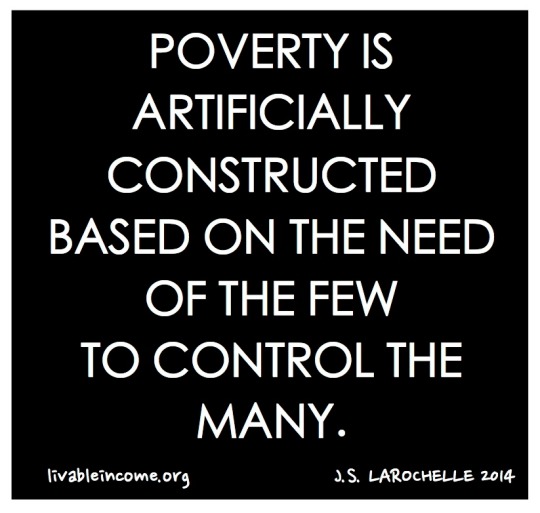
Intro by C.A. L’Hirondelle
This article is going to sound preposterous, ludicrous, nutty, absurd and any other word for outrageously unbelievable that you can find in a thesaurus. That’s because it is taboo to say that the very thing that almost everyone says is necessary for people to make a living is actually the very thing that is robbing us of all human health and a livable environment. Only those who are in the David Graeber school of jobs criticism are the exception.
It is almost universally accepted that jobs are the solution to poverty,
not the cause of it.
But first… a word from our sponsor:
JOBS JOBS JOBS JOBS JOBS JOBS
IF YOU WANT MORE JOBS, EAT MORE DONUTS, JUNK FOOD, DRINK MORE POP AND ALCOHOL, WATCH MORE TV, BUY MORE THINGS IN THE MALL, DRIVE YOUR CAR MORE, GIVE WAR A CHANCE TO CREATE MORE JOBS, HOPE FOR MORE SOCIAL BREAKDOWN TO GET MORE JOBS FOR POLICE, SOCIAL WORKERS, CHARITIES, LAWYERS, and finally, GET SICK MORE TO CREATE MORE JOBS FOR MEDICAL INDUSTRIES.
HOW JOBS CAUSE POVERTY
By J.S. Larochelle
Question: Why do some people get paid for working while others don’t?
Work must be done in order to have food and the other things we need to stay alive. This work includes growing, harvesting, and transporting food, and then also shopping, cooking, cleaning, planning meals, testing recipes, and even learning about nutrition.
The task of feeding the world’s people requires an enormous amount of collective time and effort. While millions of people every day work for pay in the food industry, millions of others do vast amounts of unpaid work related to food. And that unpaid work is essential to the continued existence of paid jobs. Digest that: The very work that is a pre-requisite to paid work — gets no pay.
THE DIVISION OF PAID AND UNPAID LABOUR
“Unpaid labour is a taboo subject because acknowledging it would undermine the ideological foundations of capitalism.” — C. L’Hirondelle, 2002
Historically, it was men who did paid work outside the home while women did unpaid work in the home. One of the reasons given for this division of labour was that women needed to feed children. But if mothers hadn’t provided this vital service to society, the people with paid work would have had to take time away from their jobs to feed their children.
Children are also not paid for the work they do — for society— as children. And unless they have a paid job outside the home, they are not even thought of as working. Like everyone else, they too need guaranteed access to nutritious food to be healthy and grow to healthy adulthood. When they don’t get the things they need to stay healthy during childhood, they can negatively impact them for the rest of their lives.
Anyone who does unpaid work and can’t find a reliable source of income risks living in ill health and abject poverty.
Another problem with unpaid work is that it creates the illusion that only the paid workers create societies’ wealth.
This is entirely false because, without shoppers and consumers, store owners would quickly go bankrupt.
In The Wealth of Nations, Adam Smith points out: “Consumption is the sole end and purpose of all production; and the interest of the producer ought to be attended to, only so far as it may be necessary for promoting that of the consumer. The maxim is so perfectly self-evident, that it would be absurd to attempt to prove it.”
As it turns out, paid producers are dependent on unpaid shoppers and consumers. And yet Adam Smith’s self-evident maxim — that consumption is the sole purpose of production— is rarely discussed in economic debate. This is because few economists will admit that capitalism can only prosper by not paying for most of the world’s true work.
Instead, status quo economics justifies that some people become wealthy because they work hard and are very productive while other people are poor because they don’t. In other words, the powerful define economic terms to their own advantage, which lets them simply steal wealth from others.
A stark example of this is slavery: people work and create value while other people steal that value and claim it as their own ‘private’ property. Historically, governments made slavery legal; it was the legalization of theft for the benefit of the few. It’s one way the powerful make laws that distort the process of government and then use those laws to create the illusion of individualism, self-sufficiency, independence and freedom.
THE HISTORY OF POVERTY
Americans were waging a revolutionary war against the British because they wanted to gain their freedom and independence. This happened at the same time they were openly stealing the work done by slaves and were also stealing the lands of Indigenous peoples who had been living on the continent for many thousands of years.
Throughout history, the rich and powerful use physical force and coercion to gain wealth by stealing it from others and privatizing it. Then they lie about how they got wealthy and chalk it up to “hard work”.
All over the world, natural resources are being ‘privatized,’ and thus average people have no choice but to find a job or starve. And this process of fencing in all-natural resources will kill many millions of people when the world’s job market goes into the next depression.
“Only after people’s capacity to subsist is destroyed, are they totally and unconditionally in the power of capital.” — The Subsistence Perspective, Mies and Bennholdt-Thomsen
“Deprive a child of all clean water or protein, and the child will invariably suffer rapid degeneration of life-powers. Deprive a person of habitation in most climates, and that person will soon experience a very reduced range of thought, feeling, and movement and, perhaps, in a number of hours, death from exposure.” — John McMurtry, Unequal Freedoms: The Global Market as an Ethical System
WORK/WAGE SLAVERY AS SOCIAL CONTROL
For decades now, we have been told that more jobs and only more jobs will solve our social and economic problems. Even progressives call for “good, dignified, unionized jobs” ("Green New Deal with Alexandria Ocasio-Cortez" on All In with Chris Hayes on MSNBC, March 29, 2019)
But we must ask why the world’s economy isn’t producing a sufficient quantity of the material things and services that all people need to be healthy and not live in poverty?
Surely, if average people had power, they would demand to build enough houses and grow enough food for all. One aspect of wage slavery is having no control over what work we do on the job. Another is not being paid enough to meet basic health needs.
Many politicians and social leaders act as if economics were somehow ethically neutral and that it makes no difference what the world’s businesses produce as long as the business owners and investors make sufficient profits. They also seem to not care that many people’s wages are far too low to maintain adequate health.
“Life has become the instrument of capital expansion, rather than investors’ capital being a means to enable human life. The world of values has been turned upside down.” — John McMurtry, The Economics of Life and Death
Everyone values their own good health and life above all else and would act to preserve it. In order to do this, we must use a portion of our time and natural resources to ensure that we have nutritious food, housing and other life-sustaining things.
However, businesses are compelled by market forces to reduce costs as much as possible. If that means generating higher profits by firing workers and replacing them with more productive machines, that is what they do. Over the last centuries, there has been rising productivity solely due to fast, efficient machines spewing out vast quantities of everything under the sun.
This mass production has meant mass consumption. And in many cases, we have mass over-consumption of types of products that create mass ill health. In turn, this creates jobs in the growing health care and medical industries. However, many jobs are now dependent on the continuation of the ill health caused by over-consumption. Can we afford to keep this cost of jobs going?
THE BURNING ISSUE OF WHAT PEOPLE NEED
No one needs to consume junk food to be healthy or to have a good life, and yet, the market system is producing staggering quantities of it.
“The burning issue of what people need, as distinguished from their ‘effective demand’ is never raised in market analysis.” — John McMurtry
No one lives in poverty due to a shortage of junk food and junk products. Yet in the last century vast amounts of time, energy and material resources have been requisitioned by the business sector to produce and sell more of it.
This is another huge cost of jobs that we can’t afford. This is because we could instead use these same junk food and junk product resources to build homes, community gardens, and provide clean water, sanitation and health care.
THE QUESTION OF FREEDOM
Free-market business people and their political, media and academic allies point out that their economic freedom permits them to do as they please. But ‘freedom’ does not explain why business people choose to make and aggressively market, advertise and sell products that cause ill health.
Business people continue to make and sell junk food because they have no choice under the market system. John McMurtry calls this “the freedom of no alternative”.
Why is it that businesses have had to take little to no responsibility for how their economic activities affect people and the planet?
“Seduced by the dangerous illusion that our technologies place us beyond the constraints of life's natural limits, and forgetful that we have created economic institutions for which the creation of livelihoods is incidental to the making of money for those who already have far more than they need. The result is an economic system that is mindlessly converting life into money in an act of collective insanity.” — David Korten, forward to Richard Douthwaite’s “The Growth Illusion”
CONCLUSION: A REVOLT AGAINST DESTRUCTIVE JOBS AND ‘ILLTH’
There is only a very small minority of people who benefit from the present system of destructive jobs and health-destroying products.
John Ruskin, the nineteenth-century writer, used the term “illth” to describe the fact that the economy produces ‘bad’ products as well as good.
Now in the twenty-first century, we have an out-of-control market-driven economic system. Millions of people have jobs that depend on “illth” industries that produce widespread ill-health while millions of others live and die in poverty.
It should be clear by now that current social and political leaders are so completely hampered by their own financial self-interests that they have no will to solve the world’s poverty or environmental problems.
This means that average people will have to take action and start speaking out against the high costs of jobs. It means loudly withdrawing our support for the current job system. And if we can, refusing to work at destructive jobs. It means ensuring that people have access to the resources we need to feed and shelter ourselves. It means demanding a guaranteed income as a just transition to a livable economy. This will allow us to end destructive work, and instead work to grow and build things for their health value and for permanence —not merely for their cold, hard ‘cash’ value.
Resources:
What is Jobism?
David Graeber on Jobs
Gary Gardner and Brian Halweil: Underfed and Overfed: The Global Epidemic of Malnutrition, 2000. http://www.worldwatch.org/pubs/paper/150.html (no longer available)
The Growth Illusion: How Economic Growth Has Enriched the Few, Impoverished the Many, and Endangered the Planet, 1992, 1999, by Richard Douthwaite
#jobism#basicincome#davidgraeber#bullshitjobs#thegreatresignation#livable4all#environment#guaranteedlivableincome#greennewdeal
1 note
·
View note
Photo

“Decades of studies have shown that health care accounts for less than 25% of health outcomes. The upstream factors that affect health — such as income, education, employment, housing, and food security — have a far greater impact on whether we will be ill or well. Of these, income has the most powerful influence, as it shapes access to the other health determinants.” Basic Income: Just What the Doctor Ordered By Danielle Martin and Ryan Meili
1 note
·
View note
Text
What is rich-washing?

INTRODUCTION
What is rich-washing? It is when cultural products and advertising make it seem like everyone is rich.
It's similar to whitewashing, where a problem is covered up and made to seem fine, when it is not; or Hollywood whitewashing, where white actors take roles over people of colour; or activist whitewashing, where white activists are spotlighted over people of colour; or greenwashing, where things are made to seem environmentally good, when they are not.
Much has been written about the media biases regarding sexism, racism, ableism, homophobia, transphobia, harmful depictions of mental illness, and other biases that stereotype or denigrate specific groups of people. However, not as much has been written about classism in North American media and entertainment.
Rich-washing is a type of classism, but it is much more than that.
Rich-washing completely flips the facts: in the real world, there’s a huge majority of financially precarious people at the bottom and a tiny minority at the top.
And for those at the very top in the U.S., their wealth is growing.
Rich-washing takes the bulk of people on the planet and makes them disappear –– they are over-looked, glossed over, cropped out of the picture, written out of the story.
Rich-washing is gas-lighting on a grand scale. It is so wide-spread that it is almost invisible. Like the dish soap ad used to say, we’re soaking in it.
Because it is such a blatant misrepresentation of the world, rich-washing has many harmful effects on people and the planet. It is important to expose this type of propaganda to reduce its harm.
However, the answer is not to change entertainment to only reflect social reality. No, this is not a call for censorship, but to point out how pop-culture is currently censored by those who hold the purse strings. Ultimately, the answer is to change our social reality to make it less harsh and more livable for everyone. More on this at the end.
Pop-culture is being censored by those who hold the purse strings
Most people are not rich but you’d never know that in today’s 21st century North American TV shows, movies, print media, social media and especially advertisements. (For whatever reason, entertainment in the UK has more social realism and much less rich-washing.)
Images of the rich and super-rich have come to dominate everything in a massive cultural mono-crop of shining hair shining teeth shining cars and shining homes filled with shining gadgets.
Yes, there are exceptions (see end). However, these exceptions are mostly “drowned in a sea of irrelevance” (as Aldous Huxley said).
Ursula Franklin called this general effect “censorship by stuffing”. Specifically with rich-washing, the ‘rich’ images are so numerous that they obliterate every other view of society.
“It is all too easy to confuse the sheer quantity of media with diversity of viewpoint. We do not notice that essentially the same messages are being repeated.” –– Mediaspeak, 1983
Get out the corporate pressure-washer, aim it at the public, turn it on max.
Or as Bertolt Brecht said: “The powerful of the earth create the poor but they cannot bear to look at them.”
Advertisers also don’t like it when the poor look at each other.
“In the 1960s... CBS dropped a number of popular prime-time shows such as ‘The Beverly Hillbillies’ and ‘Andy Griffith’ because they attracted the wrong audience –– elderly, low income, and rural viewers. Advertisers had become keen on young, affluent urbanites…” ––Social Communication in Advertising, 1986

One of the worst things rich-washing does is make people think they are in a minority when in fact they are a huge majority.
Most Americans, for example, live paycheck-to-paycheck according to Forbes.
Rich-washing takes an enormous psychological toll because it creates the idea that lack of income is some kind of personal failing, rather than a systemic economic failing that affects many, many people. That’s one reason why unemployment is a huge factor in suicides.
“When the money isn’t there... feelings of deprivation, personal failure, and deep psychic pain result. In a culture where consuming means so much, not having money is a profound social disability.” ––Juliet Schor, The Overspent American,1999
Rich-washing also creates social solidarity and affinity with the rich, since proximity creates affinity.
People get used to seeing things from the point of view of the rich and may also take on the idea that their own riches are just around the corner. This has political implications (more on that below).
In addition, it’s common for negative characteristics to be attached to people who are poor.
Laziness, criminality, stupidity, and lack of morals, are often characteristics attributed to fictional poor people. This has real world consequences.
Film critic Roger Ebert famously said that movies create empathy.
“...the movies are like a machine that generates empathy. It lets you understand a little bit more about different hopes, aspirations, dreams and fears. It helps us to identify with the people who are sharing this journey with us."
While many movies have indeed had a positive effect on society because of this empathy effect, entertainment products can also empower negative stereotypes. And when it comes to the war on the poor, Hollywood most definitely is not on the side of the poor.
“In a lot of films, especially coming out of Hollywood, less fortunate families are portrayed as imbeciles.” ––Chris Stuckmann, movie review of Parasite, Nov. 6, 2019
“It’s a central assumption of our pop-culture that people who have nice shit are good, and people in poverty are bad.” ––Cracked Podcast, “Why pop-culture hates poor people” 2015-03-02
“There’s class warfare, all right, but it’s my class, the rich class, that’s making war, and we’re winning.” ––Warren Buffet, quoted in Plutocrats by Chrystia Freeland, 2012
With all the vilification and humiliation of poor people in pop-culture, who would want to identify with the poor and not the rich? Who would want to identify with the economic losers and not the economic winners?
“…it is the general policy of advertisers to glamorize their products, the people who buy them, and the whole American and economic scene.” ––Elmer Rice, quoted in Mediaspeak, 1983
Advertisements are highly polished rich-washing because companies need their products associated with winners not losers.
But rich-washing sells more than just consumer products.
Rich-washing sells political ideas.
Rich-washing reinforces policies and laws that benefit those at the top of the income pyramid. So it is not surprising when we learn that income inequality and wealth concentration have been getting worse.

Income inequality and wealth concentration in the U.S. increasing since 1980s.
“Ray Dalio, the billionaire founder of the world’s biggest hedge fund, says income inequality in the U.S. has become so dire that if he were in the White House, he would declare it a national emergency.” Barron’s, 2019
Instead of looking at the big picture and wondering why is it that so many people are poor, people assume or are told that it is their own fault if they are poor. People point fingers at themselves, at other poor people (lateral violence), but almost never up at the top.
“If there was ever a system which enchanted its subjects with dreams (of freedom, of how your success depends on yourself, of the run of luck which is just around the corner, of unconstrained pleasures…), then it is capitalism.” ––Slavoj Zizek, First as Tragedy, Then as Farce, 2009
This type of deflection ––away from the rich and scapegoating the poor–– was also behind the witch-burning craze of centuries ago.
Anthropologist Marvin Harris in his book on “the Riddles of Culture” noted:
“the principal result of the witch-hunt system (aside from charred bodies) was that the poor came to believe that they were being victimized by witches and devils instead of princes and popes.” ––Mavin Harris, Cows, Pigs, Wars and Witches, 1975
It turns out that if you get people fearful of imaginary things and suspicious of their neighbours, they are less likely to join together in a peasant revolt and storm the castle, pitchforks in hand.
“It is from us and our labour that everything comes, with which They maintain Their pomp [!]” John Ball of the violent Peasant Revolt of 1381
When it comes to numbers, it should be obvious that the one percenters at the top have a precarious hold on power.
“Why has the response to rising inequality been a drive to reduce taxes on the rich? ... It’s not a simple matter of rich people voting themselves a better deal: there just aren’t enough of them.” ––Paul Krugman, The Great Unraveling, 2003
Rich-washing protects the status-quo by reinforcing the idea that most people are rich, and if you are not, it is your own fault. Rich-washing thus deepens poverty and enlarges the holdings of the super-wealthy.
Rich-washing can also push people into unhealthy behaviours –– everything from compulsive shopping and debt, to self-medicating, and even crime.
As it turns out, when people started watching TV in America in the 1950s, a particular type of crime suddenly rose: larceny (theft of private property). Researchers attributed the increase in larceny to feelings of “relative deprivation and frustration” and that upper- and middle class lifestyles were “overwhelmingly portrayed” on TV. (Impact of the introduction of television on crime in the United States, 1982, noted in Mediaspeak, 1983)
Another troubling by-product of rich-washing is how people become very vulnerable to scams and schemes.
“We are no longer ‘family’ we are ‘warm prospects.’ ––anonymous reviewer of False Profits, 2015
People want to believe the promises of all kinds of scammers offering them the American Dream. (Check out Season 1 of The Dream podcast). Because of the shame and pain of being poor, because of being an outcast from the perceived norm of upper-middle class consumption, people are desperate to get some dignity and hope back. Many women get into recruitment marketing for “the sense of community, friendship, and purpose that comes with being a vendor.”
However, less than one percent of Multi-Level Marketing participants make a profit.
“Failure and loss rates for MLMs are not comparable with legitimate small businesses, which have been found to be profitable for 39% over the lifetime of the business; whereas less than 1% of MLM participants profit. MLM makes even gambling look like a safe bet in comparison.” (PDF) John M. Taylor, 2011 Consumer Awareness Institute paper at FTC.gov.
Ironically, the stories of big-time con artists and scammers have become popular entertainment themselves and are the subject of many documentaries, movies and podcasts.
Finally, the biggest harm from rich-washing is to the environment ––our biosphere upon which all life depends.
“Modern economies expand, but the ecosystems that provide for them do not.” ––Steven Stoll, The Great Delusion, 2008
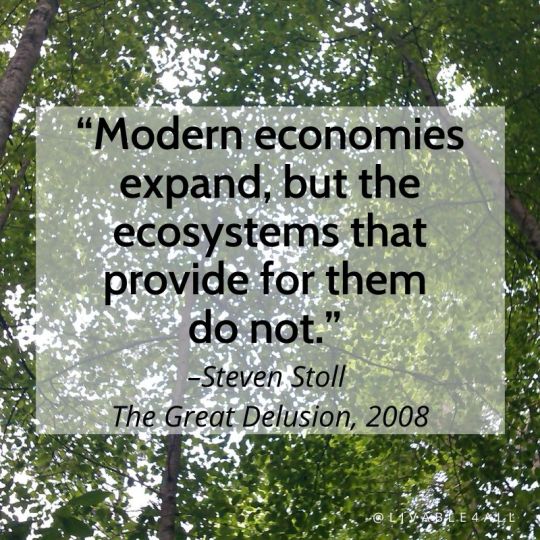
Mass consumption is a requirement of the current economic growth model and rich-washing helps keep it all going. So we end up with things like ‘fast fashion’, disposable everything, and planned obsolescence.
“Left unconstrained by other forces, the free-market system is one of the most restless, destructive arrangements ever contrived ––tearing down and building up, obsoleting last year’s fashions and praising this year’s, ... and scheming always to reduce the arts and sciences to sycophancy. None of which is a secret...” ––Thomas Frank, The Wrecking Crew, 2008
Rich-washing irony ––who is ruining the environment: rich or poor?
“World's richest 10% produce half of global carbon emissions, says Oxfam” ––Guardian, 2015
Rich-washing has another sadistic effect on low income people’s mental health. The world, it seems, is waking up to the potentially catastrophic harm being inflicted on the environment. And yet poor people are still made to feel like pieces of shit, even though they consume the least and do the least harm to the planet. So really... f*ck off with your spectacle of sparkling gold-plated glorification of the wealthy, please.
Three reasons for rich-washing
As previously mentioned, one reason for rich-washing is that corporations want their advertisements to reach higher income viewers. Another reason for rich-washing is for political propaganda: it protects the status quo by pushing the idea that everyone is mostly rich, and if you are poor, it is your own fault.
A third reason for rich-washing is that media creators, like everyone else, need to survive financially. Creators need to attract viewers. In most cases, this has led to an overwhelming focus on the rich and famous.
“Sponsors prefer beautiful people in mouth-watering decor, to convey what it means to climb the socio-economic ladder...” ––Mediaspeak, 1983
Today, due to an increasingly crowded arena and variety of cultural products, this is a bigger challenge than ever before. What’s going to get people’s attention? What’s going to be popular escapism? Very often this will be flashy settings, fancy costumes, a focus on the wealthy or the royal. Just how many shows about royalty do we need? Never too many apparently.
And when a story goes for gritty settings and characters, this usually means crime, jolting action and high conflict.
As Jerry Mander wrote in his now ancient 1977 book about television, things like violence, death, jealously, lust, materialism, conflict, the loud, the bizarre, the shocking and the superficial are easier to depict on television than their quiet, cooperative, and nuanced opposites. He laments that this is the type of world that TV “inevitably transmits”. No wonder he argued for the elimination of television.
(However, it should be noted that people used to worry about bad effects from “penny dreadfuls” and pocket-books, although Mander points out that watching TV puts people in a passive state, but reading does not.)
David Simon, creator of The Wire, one of the most critically acclaimed TV series ever made, had this to say about the impact of advertising on media:
“And how exactly do we put Visa-wielding consumers in a buying mood when they are being reminded of how many of their countrymen - black, white and brown - have been shrugged aside by the march of unrestrained bottom-line capitalism?” ––David Simon, The Wire, Truth Be Told (book), 2009, HBO
(Read more about The Wire below, under “Exceptions”)
Another irony about media rich-washing…
Low income people often consume a lot of escapist media because it is a cheap and easy way to get a break from the health-ruining, cortisol-producing daily grind of life on poverty incomes. Fictional and fantastical worlds are often the only affordable escape for those of meagre means. Thus, it is not surprising when people get an intense attachment to their favourite entertainment if it provides them with stress release, comfort and meaning.
“… a 21-year-old in Michigan, finds it easier to get excited about playing games than his part-time job making sandwiches…” ––Andrew Yang, The War on Normal People, 2018
The opening scene of the movie Ready Player One envisions an extreme dystopian version of this. Rickety trailers in squalid surroundings are stacked sky high. Those living inside wear virtual reality goggles to escape from their over-crowded lives into limitless virtual worlds.
It’s important to note that escapism as a form of coping with stress and trauma has its place. The answer is not to take away people’s beloved forms of escapism. (E.g. the excellent book by Raziel Reid “When Everything Feels Like the Movies”.) The answer is for humanity to strive to create a healthier and less stressful world where people don’t feel such a tremendous need to escape from reality.
But you don’t need to watch dystopian movies to see that public spaces are shrinking and becoming more unlivable. Even city benches are designed to be a miserable experience. (You know. To solve homelessness of course.) It is no wonder people stare into their screens like never before. We are ruining the public sphere and forcing people into private spaces where the goodness or badness of those places is determined by how much money you have.
The bright glare of rich-washing might be dimming
“Am I alone in being disgusted by excessive wealth? It seems like a moral failing rather than something to celebrate or aspire to.” ––Nigel Warburton Philosophybites (twitter), January 19, 2020
In 2019 there were three movies that ripped the shiny bandaid of rich-washing propaganda off the reality of mass income inequality: Jordan Peele’s US, Bong Joon-Ho’s Parasite, and the controversial Joker... a character study only remotely related to the comic book story.
There’s been much written and spoken about these movies already. Suffice to say that poverty and the underclasses jump out of the screen in unexpected ways and the wealthy are not shown with shining virtuous haloes.
Even the super-rich (in real life) are starting to notice the current economic system is a disaster:
“At least a dozen billionaires have made public statements that call for the super-rich to pay more in taxes.” Forbes, Oct. 15, 2019
Meanwhile, support for a universal income benefit is spreading rapidly. (Thanks in no small part to Andrew Yang.) People are calling bullshit on the idea that there can ever be a living wage job for everyone who needs one. People are also calling bullshit on the idea that only paid work is real work. There’s a huge constituency of people who provide unpaid care for their loved ones. These unpaid carers have been diminished and ignored for far too long by both the political right (who are full of cheap platitudes about ‘the family’) and the political left (who are full of out-dated platitudes about ‘the workers’).
People are also calling bullshit on poverty itself since it’s obvious that there is more than enough for everyone on the planet to live with dignity and health. There is no reason for poverty to exist at all ––other than out-of-control greed and massive economic lies. Both of which are propped up by rich-washing.
Because of the increasingly obvious and growing gap between the haves and have-nots, cultural products might finally be moving away from rich-washing to something similar to what Brecht brought to the theatre 100 years ago:
“...the higher world of upper class sentiments is presented from the ruthless viewpoint of the common people.” ––Martin Esslin on Brecht, 1959
Rich-washing erases the vast swath of humanity from seeing any dignified reflection of themselves. It’s time to identify this assault on regular people.
To quote the Vancouver poet Bud Osborn*:
“north america tellin lies
in our head
make you feel like shit
better off dead
so most days now
I say shout
shout for joy
shout for love
shout for you
shout for us
shout down this system
puts our souls in prison
say shout for life
shout with our last breath
shout fuck this north american culture of death
shout here we are
amazingly alive
against long odds
left for dead
shoutin this death culture
dancin this death culture
out of our heads”
*Bud Osborne 1947-2014, from Amazingly Alive and Other Poems, Vancouver, BC, 1997, Independent release, Lonesome Monsters
TO SUMMARIZE...
Here’s the thing. Public spaces are becoming increasingly harsh. Jobs and incomes are ever more unsteady, unpredictable and unlivable. People’s anxiety is on the rise. Healthy ways to relieve stress are few if you are broke. So people turn to entertainment as a form of escape. But this subjects them to rich-washing which is harmful to individuals, to society, and the environment.
Entertainment and advertising media have been teaching people that it is ok to hate, denigrate, or laugh at people in poverty. In addition, it has been teaching people who experience poverty to blame themselves, or even hate themselves.
“Propaganda offers him an object of hatred, for all propaganda is aimed at an enemy. And the hatred it offers him is not shameful, even hatred that he must hide, but a legitimate hatred, which he can justly feel.” ––Jacques Ellul, Propaganda, 1962
It is important to expose this type of propaganda to reduce its harm.
However, the answer is not to change entertainment to only reflect social reality. The answer is to change our reality so it is not so harsh for so many people.
Art can’t be censored. But it can be bent by those who hold the purse strings for their own purposes.
There is no reason for poverty to exist. Letting poverty exist is the costliest, stupidest and most tragic thing society can do. As described in Maslow’s Hierarchy of Needs, people first need to eat, we need shelter, we need health care, we need a material foundation before we can hope to have healthy, happy life. When people struggle to meet physical needs, they can’t pursue happiness needs. Or to put it another way:
“Even honest folk may act like sinners, unless they've had their customary dinners” (“How to Survive” from Threepenny Opera)
Ending poverty with a universal income benefit (aka Freedom Dividend, Guaranteed Livable income, Universal Basic Income ) is the most affordable and doable solution for people and the planet. It is our best bet to create a livable economy, a livable natural environment, and a livable social and cultural environment for humans.
In a world with income security for all, we might find our entertainment would drastically change for the better. Advertisers would no longer dominate entertainment. Creators would have more freedom to create. People would no longer seek so much escapism.
Of course, we will not have utopia ––nor should we try to create a utopia. But at least we would not be flinging ourselves into a certain dystopian future because we think there’s no other choice.
A livable income for everyone gives us a choice. #Livable4all - now- for people and the planet.
***
But wait! There’s more....
***
EXTRA SECTION 1: FAKE POVERTY TROPES
Fake poverty tropes in popular culture are different than exceptions to rich-washing (see examples next section). They are not. They are just story-telling short-cuts. They can be fun escapist entertainment, but they are ultimately rich-washing wolves in sheep’s (cheap) clothing.
i) Rags-to-riches: When someone starts poor and ends up rich. In the past, these tales were called Horatio Alger stories, where hard work and honesty bring success to the hero. A sub-genre of this trope is the criminal rags-to-riches story. Riches are won through criminality, violence, hustles, or scams. This usually ends badly for the anti-heroe(s). However, usually not before a display of luxurious settings and wardrobes. Or in some shows, just piles and piles of cash, gold, jewels, etc.
ii) How can they afford that?: This is when people with very marginal jobs and incomes somehow have homes and/or lifestyles that would be impossible with a similar income in real life. These are the kind of TV shows that leaves the audience wondering: “What? how can they afford that?”
iii) Rich Relations: This is when financially poor characters live on the periphery of rich people. These characters might be broke and in debt, but they have close family or friends who are very well-off. Again, even though the main character might be ‘skins’, the audience is shown some fancy settings and aspirational fashion.
iv) Magic Money Wand: This is when the poverty problems of the hero are magically solved when the hero gets a sudden windfall of money from a wealthy family member, friend, mysterious benefactor, or by winning something.
EXTRA SECTON 2: RECENT EXCEPTIONS TO RICH-WASHING
There are a few notable exceptions to rich-washing described here. Note: UK productions (except for one) are not included because, for whatever reason, the UK has an abundance of TV shows and films from a working class perspective. (See also the films of Ken Loach and Tony Garnett.)
The Wire began in 2002, was only 5 seasons, and is now considered a masterpiece of television. One reviewer describes it as being about “post-industrial collapse” and “institutional dysfunction” in an American city (Baltimore). Sounds bleak, but it was rare social realism with unconventional heroes and story-telling. It had low ratings at first. Apparently, showing that the “American Dream was dead” did not catch on right away. However, HBO, which relies on subscriptions, not advertising, was willing to “simply let it be” said creator, David Simon. He also describes just how much the mass media has failed America’s disenfranchised
The Wire (TV series)
“The Wire avoided victories, preferring to show corruption, failure and decay. ... The Wire was as much journalism as entertainment – a form of protest television.” ––Dorian Lynskey, The Guardian, 2018
The Wire began in 2002, was only 5 seasons, and is now considered a masterpiece of television. One reviewer describes it as being about “post-industrial collapse” and “institutional dysfunction” in an American city (Baltimore). Sounds bleak, but it was rare social realism with unconventional heroes and story-telling. It had low ratings at first. Apparently, revealing the “American Dream was dead” did not catch on right away. However, HBO, funded by subscriptions, not advertising, was willing to “simply let it be”. according to its creator, David Simon.
“…how can a television network serve the needs of advertisers while ruminating on the empty spaces in American society and informing viewers that they are a disenfranchised people, that the processes of redress have been rusted shut, and that no one - certainly not our mass media - is going to sound any alarm?” ––David Simon, The Wire, Truth Be Told (book) 2005
Atlanta (TV series)
“...the show’s brilliance [is] at combining absurdist comedy with heartbreaking reality to create something entirely unique.” ––Yohana Desta, Vanity Fair, 2017
Atlanta is a mix of sharp social realism, sudden comic moments, gut-wrenching scenes and hard-hitting parody that includes a searing fake commercial for children’s cereal. It is like the Eduardo Galeano of TV, but with some Salvador Dali, Brecht, and comedy thrown in. Series creator Donald Glover needed to disguise his vision in order to get it made.
“I was Trojan-horsing FX. If I told them what I really wanted to do, it wouldn't have gotten made." ... My struggle is to use my humanity to create a classic work—but I don’t know if humanity is worth it, or if we’re going to make it. I don’t know if there’s much time left.”––Donald Glover interview, New Yorker, 2018
Black Mirror - Fifteen Million Merits (series)
“What archetype dystopian future does Black Mirror’s “Fifteen Million Merits” choose to model itself after? Orwell’s or Huxley’s? The answer ends up being: a little bit of both.” ––Den of Geek, 2018
Fifteen Million Merits stars Daniel Kaluuya (also the star of Get Out). The episode begins with a dystopian-lite near-future story. However, it quickly compresses the characters ––and viewers–– into a painful claustrophobic nightmare vision of a capitalist hostage-taking entertainment monopoly.
Breaking Bad (TV series)
This was massively popular show that ran from 2008 to 2013. The main character is a chemistry teacher named Walt who was first motivated to be Bad due to a cancer diagnosis and fear for the financial future of his family. However, once he started down the bad path, he quickly accelerated to the far reaches of very bad badness. Partly this was because of his ‘almost-got-rich’ backstory. In one episode he goes to the house party of his former business partner who is now very wealthy. Walt’s feelings of poverty, failure, and humiliation are stark. In real life this pain is usually turned inward, but in the show it becomes grist for the monster that the character becomes. Millions of people related to this character who lived under the fear of poverty in the land of plenty.
However, Breaking Bad is mostly a rags-to-riches fake poverty trope even though it was a lower-middle class character’s fear of rags that sparked his need and greed for riches. With its very individualistic focus, the story continues the myth of independence carried over from the fictional old wild west of heroes and outlaws. But in this case the outlaw is the hero.
But perhaps its lasting legacy will be an oft seen meme showing how Breaking Bad would have had no story at all had it been set in a country with universal healthcare. It’s accurate to say the real monster in Breaking Bad is a modern wealthy country without healthcare.
Shameless (TV series)
“Few shows have attempted to situate themselves in the living nightmare of poverty—the country’s quiet shame, the marginalized that the middle and upper classes don’t want to see next to the numbing comfort of Modern Family. Television ignores the poor just as Americans do.” ––Flood Magazine, 2016
In a lot of ways Shameless is a big brash bold exception to rich-washing. The creator of the semi-autobiographical British version said “It’s not blue collar; it’s no collar.” However, after 9 seasons, the US version succumbs to several fake poverty tropes. Nonetheless, it is unique, and its many fans find the characters in the chaotic, desperate, scrounging, scamming, and poverty-stricken Gallager family relatable.
“I love how it addresses sex, drugs, poverty, absent parents, and other topics like those.” ––commenter, TV Criticism blog, 2014
Critics have questioned the series for its condescending stereotypes, for turning poverty into entertainment, for relying on too many nude scenes, and for their treatment of black characters.
But the overarching message and source of comedy for this show is in the title, which tells us that if you are poor, you should feel shame. This family doesn’t feel shame about their poverty. They are ‘shameless’, some more than others, and comedy ensues from their rude, crude, shocking behaviour and occasional truth-telling observations about society.
EXTRA SECTION 3: WAY BACK EXCEPTIONS
In the 1970s there were many more TV shows featuring regular people: Sanford & Sons (set in a salvage yard); Laverne & Shirley (factory workers); and, in Canada, The Beachcombers (salvage).

There were even some down-market detectives including the very popular Columbo who wore rumpled clothes and drove an old jalopy. Fans loved how rich villains would be caught because of their arrogance and snobbery: they assumed Columbo was a bumbling idiot because of his humble presentation.

The Rockford Files detective (1974-1980) also had a shabby vibe. The main character (Rockford) had done time, lived with his father in an old trailer, and had no office or secretary ––just an answering machine on his cluttered desk. He did, however, have a fast car and was played by James Garner, former star of the popular TV western Maverick.
Rural set TV series were also fairly common.
“Over one-third of shows in 1950 were set in small towns or rural areas, mostly Westerns and comedies.” ––Brookings Institute
The Beverly Hillbillies was popular comedy in the 1960s. It was a rags-to-riches and fish-out-of-water story. However, the show regularly made rich people look ridiculous even though the suddenly oil-rich hillbillies were also comic characters. But they were the heroes of their story. This show got cancelled despite its popularity as advertisers wanted younger urban viewers and not the rural and older viewers that show attracted. (Social Communication in Advertising, 1986)
Other rural set shows were Green Acres (inept rich people try to homestead with comic results), Petticoat Junction (another comedy), The Waltons, and Little House on the Prairie (dramas). There was also 17 seasons (1954-1973) of Lassie (a dog) with farming and wilderness settings.Going waaay back... growing up Canadian in the 1960s and 70s meant watching The Forest Rangers and Adventures in Rainbow Country, both shows featuring child characters who showed off skills such as fishing, wood craft, horseback riding, and wilderness survival.
EXTRA SECTION 4: THE WORLD’S LONGEST RUNNING SOAP
“So I'm a British guy who had an overnight stay in Toronto to connect a flight, and I noticed Corrie is shown in primetime on CBC... I’m just astonished anyone outside of Northern England would give a toss about it.” Reddit comment, 2018
You can’t talk about exceptions to rich-washing without talking about Coronation Street, the world’s longest running soap. Set ‘on the cobbles’ of a small fictional corner of working class Greater Manchester in Northwest England, it began in the 1960s and is still going strong. (Update May 2020- the pandemic has in fact interrupted Corrie.)
Coronation Street has grit, unlike US soaps, which would never have characters working in an underwear factory and organizing actions against management, or working in a fast food shops, barber shops, driving taxi, or grease pits fixing cars. With a few exceptions, most homes on the street look over-stuffed and very lived-in. The real living room of the street is the local pub, a cosy nostalgic setting, and nostalgia is a big part of the show’s popularity.
The street has changed and expanded over the years, but it has changed slowly. Characters who come and go with frequency except for the core characters. This includes several very popular and very elder actors who get substantial storylines. In addition, “Corrie”, as the fans refer to it, is also known for having snarky battle-axe women characters. One of the oldest was Ena Sharples, and one of the newest, Evelyn Plummer. And unlike U.S. entertainment, younger characters don’t all look and sound like glossy over-polished models-slash-actors.
In recent years Corrie has tackled numerous serious social issues such as suicide, homelessness, mental health, addiction, male rape, human trafficking, teen pregnancy, life after jail, and spousal abuse (to name just a few). These storylines are done carefully with advice from experts and advocate groups. They also frequently address classism. However, the show is not all doom and gloom. Coronation Street blends silly comedy, murderous villains, crimes big and small, and many ridiculous eye-rolling storylines. Fans heap an equal amount of complaints as praise. But big picture, Corrie is notable for the fact that it almost never got onto the airwaves at all.

Contrast between a working class UK soap and a US soap

Other Resources:
Books:
Deer-hunting with Jesus by Joe Bageant, who writes about populism in southern rural poor communities in the U.S. (and his hometown) and why they might vote against their own self-interest.
Somebodies and Nobodies by Robert W. Fuller who writes about abuse of power by those who have higher status or rank against those of lower status.
From Movie Lot to Beachhead by Look Magazine (1945) Written at the end of WWII, the publishers wanted to show how Hollywood was not shallow but could rally for a cause and be on the right side of history. A big contrast to today, when it comes to the war on the poor, entertainment is very much on the wrong side of history.
Upside Down by Eduardo Galeano “a crushing satirical expose of the glaring inequalities and injustices of a world turned upside down that many has come to be desensitized as ‘normal.’” (Goodreads review)
The War on Normal People by Andrew Yang (free audiobook on youtube).
The Rebel Sell - Why the culture can’t be jammed by Joseph Heath and Andrew Potter. “But these gains [civil rights, social safety net] have not been achieved by ‘unplugging’ people from the web of illusions that governs their lives. They have been achieved through the laborious process of democratic political action.” (All forms of counterculture end up being just another marketing opportunity).
Amusing Ourselves to Death by Neil Postman “As Huxley marked in Brave New World Revisited, the civil libertarians and rationalists who are ever on the alert to oppose tyranny ‘failed to take into account man's almost infinite appetite for distractions.’ Orwell feared that the truth would be concealed from us. Huxley feared the truth would be drowned in a sea of irrelevance.”
Websites
Classism in Children’s Movies (a study) - Classism.org
A Guide to Basic Income FAQs - scottsantens.com/basic-income-faq
Podcasts
Why Pop-Culture Hates Poor People - Cracked.com 2015-03-02 “Movies don’t seem to understand what it’s like to make less than 200K a year…. If you look and live like a poor person, you might be a serial killer.”
5 ways Hollywood tricked you into hating poor people - Cracked.com 2015-02-23
***
The author was raised on books & nature and almost no TV and movies but became a telly addict & movie fan late in life.
2 notes
·
View notes
Text
Basic Income Book Giveaway
Twitter Book Giveaway December 2018: Terms and Conditions:
This giveaway is for one hardcover copy of “Financing Basic Income: Addressing the Cost Objection” edited by Richard Pereira.
Details about the book here.
A copy of the book will be posted in the mail to the winner by January 5, 2019. It will be signed by editor/author Richard Pereira.
How to enter:
This is a twitter book giveaway.
Entrants must use twitter and tweet a reply to @livable4all with the hashtag #yesbasicincome
Start date: December 12
Closing date: Midnight December 30 (GMT)
Individual personal entrants only
Individuals cannot enter more than once: No duplicate accounts.
Winner will be randomly chosen by Tweetdraw
Winner will be notified by twitter reply or direct message.
Winner must provide a valid postal mailing address to receive the book.
Winner when notified, must follow Livable4all on Twitter (in order to send a Direct Message with address details).
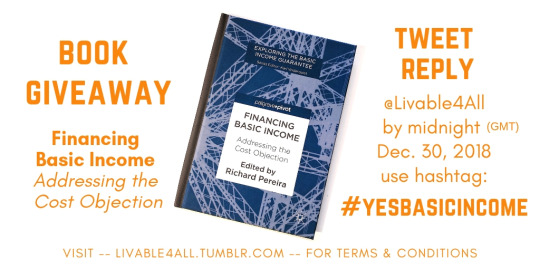
0 notes
Text
Tweeted
Some #basicincome news via @basicincomeorg: Canada: Event on Guaranteed Livable Income and Sustainable Futures https://t.co/wu8bM2khnv pic.twitter.com/VciEdp6xRX
— Scott Santens (@scottsantens) December 12, 2018
2 notes
·
View notes
Video
youtube
Trump didn’t win the election, jobs won the election.
“When Trump promised to bring back coal, people listened”
“If they take coal-mining away… we’re done”
Virginia coal-mining community - BBC News Nov. 17
People fear poverty, which means they fear losing their jobs. If they have already lost their jobs, they desperately want to get back both income and respect since we live in a society that blames people for their own poverty. People went with the person who they thought was most likely to bring them their promised jobs.
When it comes to elections, the main brands all promise jobs. Because to do otherwise, and to start talking about job loss from automation for example, or how much essential work is unpaid, or how many jobs are make-work ‘bullshit’ jobs, is like grabbing people’s world view and shaking it upside down and then having them barf all over you and after they are done barfing, they want to damn you to hell and run you out of town, even if you advocate a solution like a universal basic income (UBI).
Yet we must have these crucial cumbersome conversations in as many forms of communication as possible. Staying silent about the need for a universal livable income only prolongs the life of the lurching decaying grasping zombie idea of ‘jobs for all’ and dooms any chance that humanity will have a future. The best green job, the best for the environment, for health and for other living creatures is a non-job job. Time to end Jobism now before it is too late.
Calvin Alex Narcisse
0 notes
Text
Robert Theobald on automation and guaranteed income on CBC Ideas 1996 and 1965
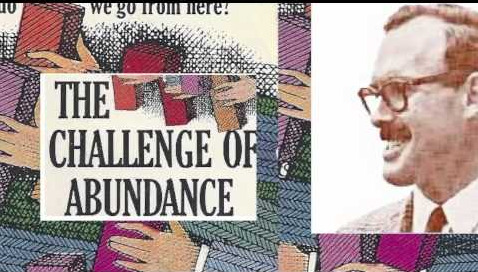
Robert Theobald did a 3-part series in 1996 on the Canadian Broadcasting Company radio program “IDEAS”. Parts were taken from a 10-part series done in 1965 for CBC by Theobald. The transcript was available on CBC IDEAS online archive until approx 2007. It is no longer online but you can find the complete text via Internet Archive Wayback Machine.
http://www.cbc.ca/ideas/old-ideas/theo.html (the old link)
https://web.archive.org/web/20070307080611/http://www.cbc.ca/ideas/old-ideas/theo.html (web archive Wayback Machine link)
Theobald audio https://www.youtube.com/watch?v=BUTwZUHJRTI
Excerpts:
“It was clear to Robert Theobald, and others, that automation and cybernation -- that is, the large-scale use of computers and robots to do repetitive clerical, or heavy and dangerous work (in automotive plants, for example) -- these machine systems were going to make lots of clerical and industrial jobs disappear. Theobald thought that society was headed for a situation where "the lower classes" were largely unemployed; the living standard of the middle class would be adequate, but their participation in public life would be minimal; and the top managers, in both business and politics, were going to be overworked to the point of distraction.He thought that the usual ways of distributing wealth in the United States were outmoded. Grudging welfare to the jobless was inefficient and demeaning -- and besides everybody in the population was needed as an active consumer if the newly efficient, automated industrial system was going to thrive. He suggested a radical way to accomplish this: what he called the guaranteed annual income.The nightmare future, beloved of science fiction writers, where machines ran everything was not inevitable, Theobald argued. This was how he put it in one of the 1965 programs.TAPE:
The drift into a dehumanized society is not necessary. Obviously our
technological power could be used to support a better world...
7:29
...an infinitely better world than any we've ever known.”
“But there's another way that income distribution might work, the so-called "guaranteed annual income." It was an idea that was hot in the sixties, and Robert Theobald was one of its main intellectual "fathers". Today this idea has disappeared entirely from public discussion. You'll hear how it might work as this series develops, in essays by Robert Theobald and discussions he had with his colleagues who were wondering, in the sixties, how to survive the evolving future. Then, unlike now, there was a sense that you could look the facts in the face, and actually do something to control the course of events. And there was a vigorous public discussion of ideas. Here's Robert Theobald with Donald Michaels of the University of Michigan, author of a string of books including "Cybernation--The Silent Conquest," and "The Unprepared Society."”
0 notes
Photo
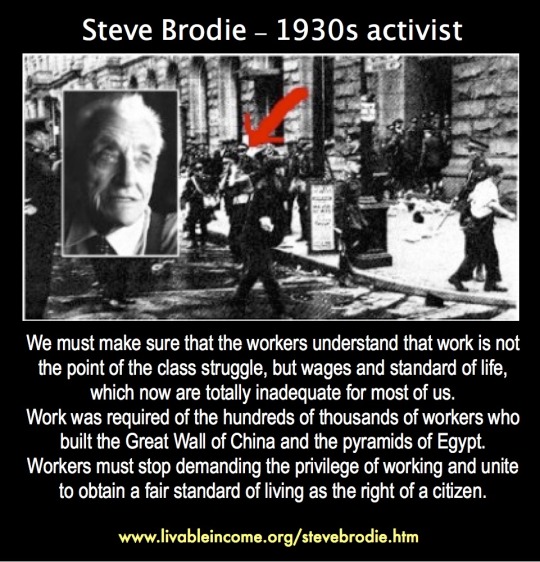
Steve Brodie - don’t demand work
“We must make sure that the workers understand that work is not the point of the class struggle, but wages and standard of life, which now are totally inadequate for most of us.
“Work was required of the hundreds of thousands of workers who built the Great Wall of China and the pyramids of Egypt.
“Workers must stop demanding the privilege of working and unite to obtain a fair standard of living as the right of a citizen.”
Read more: http://www.livableincome.org/stevebrodie.htm
Remembering Steve Brodie on May Day 2016
2 notes
·
View notes
Video
Informative talk by a Canadian research on the outcomes of the Manitoba Mincome experiment. Health outcomes would improve, this would indicate that a guaranteed livable income, aka basic income, would actually be a savings, not a cost since it would save people’s health.
vimeo
Canada’s rediscovered 1970s successful social justice experiment - The Manitoba Mincome. A December 2012 talk in Vancouver by Evelyn Forget on guaranteed income and the positive outcomes of the 1970s pilot project - The Manitoba Mincome.
1 note
·
View note
Photo
The amazingly prescient writing of Pierre Berton on economic freedom in 1968.
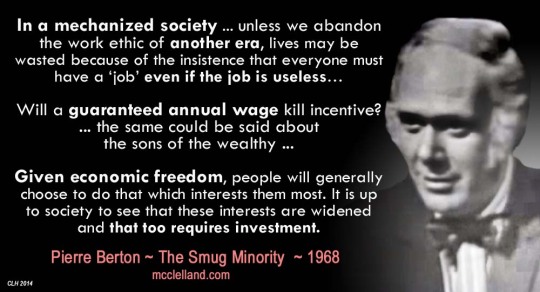
Pierre Berton, The Smug Minority, 1968.
Available as an ebook at McClelland.com
More excerpts here: http://www.livableincome.org/smugminority.htm
13 notes
·
View notes
Photo
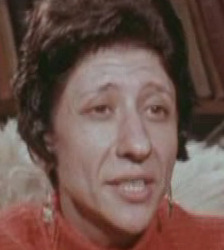

Selma James 1972 on Women, Unions and Work
"2. WE DEMAND A GUARANTEED INCOME FOR WOMEN AND FOR MEN WORKING OR NOT WORKING, MARRIED OR NOT. If we raise kids, we have a right to a living wage. The ruling class has glorified motherhood only when there is a pay packet to support it. We work for the capitalist class. Let them pay us, or else we can go to the factories and offices and put our children in their father's laps. Let's see if they can make Ford cars and change nappies at the same time.
Read more short version: http://www.livableincome.org/womenunionswork.htm
Read more long version: https://caringlabor.wordpress.com/2010/08/14/selma-james-women-the-unions-and-work-or-what-is-not-to-be-done/
Buy her book from AK press: https://www.akpress.org/womentheunionsandwork.html
0 notes
Text
#basicincome aka guaranteed annual income part of Black Panthers’ platform
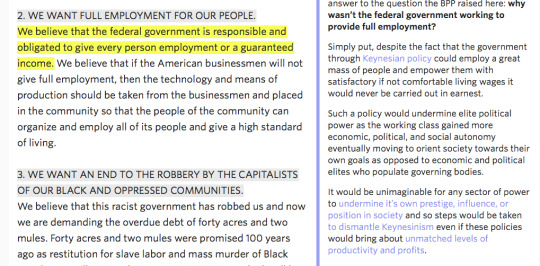
In the late 1960s The Black Panthers and Martin Luther King Jr. did not just demand employment, but presciently pointed out that if jobs were not available that there must be a guaranteed income.
2. WE WANT FULL EMPLOYMENT FOR OUR PEOPLE. We believe that the federal government is responsible and obligated to give every person employment or a guaranteed income. We believe that if the American businessmen will not give full employment, then the technology and means of production should be taken from the businessmen and placed in the community so that the people of the community can organize and employ all of its people and give a high standard of living.
Read more:
http://genius.com/3342025
Audio of Dr. Martin Luther King Jr. on guaranteed annual income
https://www.youtube.com/watch?v=s6zVj3nBmNs
Video of MLK 1967 speech on guaranteed annual income https://www.youtube.com/watch?v=BY1OKSObkH0
0 notes
Photo
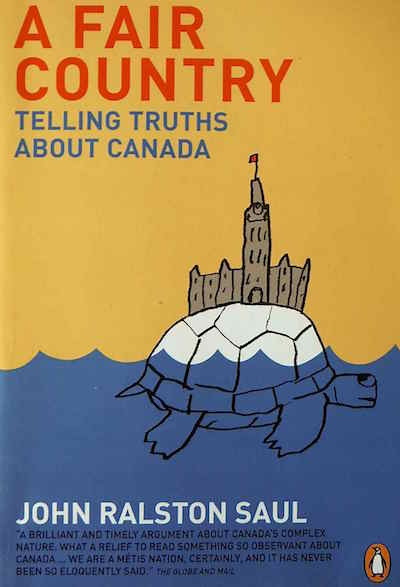
Quote from John Ralston Saul on #basicincome from A Fair Country (2009)
“Our ideas of fairness and inclusion have been based on an economic theory of investment, in which you create new possibilities of wealth by changing the conditions in which our society operates. To do this takes courage, consciousness, imagination, a taste for risk and an ethical sense of purpose. It is about conduct not contract. It is a way of thinking and acting. (page 319)
“What form could it take today? The most obvious strategic initiative from a governmental point of view would be to create what is usually called a guaranteed annual income. This is an idea that cuts across all political lines. It can satisfy an ethical fiscal conservative because it consolidates a vast range of bureaucratically cumbersome support programs into one simple policy. A great deal of administrative waste is saved. It can satisfy classic socialists or social democrats because it is a policy that treats citizens with dignity. This is the opposite if the nosy managerial desire to dissect the details of the life of the poor. ...it could break down that public and private corporatist structure that makes people feel they are caught in a series of employee or dependent relationships.” page 320
“Yes, there is a need to encourage much more citizen engagement in public causes.” page 320
“I can’t help but feel that the strategic key ...lies in a rethinking and relaunching of the co-operative movement.” page 321
“We should have been thinking, and still can, about how this model could both anchor our communities and help us move away from mass commodity extraction...” page 322
Last chapter of "A Fair Country", A Circle of Fairness, pg 320, soft cover, 2009, Penguin Canada
Learn more: http://www.johnralstonsaul.com/non-fiction-books/a-fair-country/
0 notes